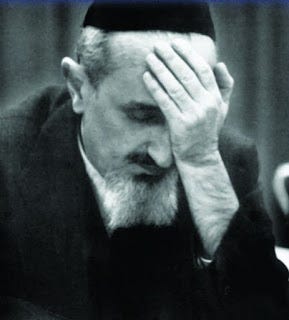The Bizarre Result
I must correct something that I wrote about Rabbi Meiselman's position. Rabbi Kornreich pointed out that Rabbi Meiselman does not, in fact, maintain that if Chazal based something on their understanding of Torah, then it must be infallible. He says that although it is overwhelmingly likely to be correct, since it is based on a deeper understanding of existence, it could still be mistaken. But - and this is the critical "but" - this is only where the Gemara itself gives some indication that there is uncertainty about it. If Chazal make a definitive statement, if they are sure that they are right, then they can't be wrong. "If they spoke definitively, it must be true."
This is how Rabbi Meiselman attempts to get around the problem of Chazal's belief that the sun goes behind the sky at night, according to the view of the Rishonim that it is to be interpreted as a dispute regarding astronomy rather than having an invented "deeper explanation." The fact the Chachmei Yisrael argued with the non-Jewish astronomers, and that Rebbi conceded to the non-Jews, is, he claims, evidence that they weren't sure about it - even though elsewhere they based this view on their understanding of pesukim.

Of course, in my opinion, this is hopelessly contrived. "Chazal" is not a person - it is lots of people. Some of them were convinced of this position, others were not. Furthermore, why on earth would the fact of someone, or even a group of people, being certain of their own position mean that it would be inconceivable that they were wrong? There's just no rationale for it. If one person can be wrong, two people can be wrong, and if two people can be wrong, a hundred people can be wrong. Rabbi Meiselman claims (p. 123) that "just as definite conclusions in halachah carry the authority of Torah sheba'al Peh, so, too in matters of fact." But this makes absolutely no sense. Halacha is a legal system, and law can have legal authority. Statements about physical reality, on the other hand, do not have authority unless there is actual reason to be certain that they are true!
But there is something else even more bizarre going on here - the extraordinary way in which this approach plays out when you compare the sun's path at night to zoology.
According to Rabbi Meiselman, it is wrong and heretical to say that Chazal mistakenly believed that bats lay eggs, that elephants and wolves have a three-year gestation, that spontaneous generation takes place. Since Chazal expressed no uncertainty in their statements on these matters, they must be correct, even if that requires some novel and bizarre or entirely unknown way of reinterpreting what they are saying. They couldn't possibly have made a mistake about the natural world (even though such zoological mistakes were very common in antiquity).
It's incredible. When it comes to a physical phenomenon as enormous and significant as where the sun goes at night, with which Chazal, who (according to Rabbi Meiselman) were in touch with deep aspects of existence, believed they could find evidence from the Torah itself, they could nevertheless be completely wrong and fall in line with Babylonian cosmology instead of the more correct Greek cosmology. But when it comes to arcane matters of zoology, about which the Torah says nothing, they were infallible and it is absolutely forbidden to say otherwise! They didn't know where the sun goes at night, but they must have known about the birthing habits of bats!
It's not just that Rabbi Meiselman's approach is intellectually dishonest to an extreme, disrespectful of a major school of thought in rabbinic history, and anti-scientific. It also leads to the most absurd results.
(If you'd like to subscribe to this blog via email, use the form on the right of the page, or send me an email and I will add you.)


